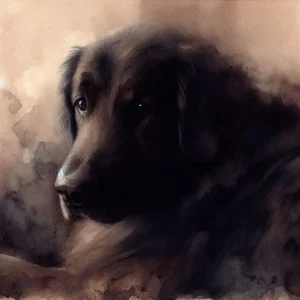Do Dogs Mourn the Loss of a Cat

Losing a beloved pet can be a heartbreaking experience for any pet owner. But have you ever wondered how dogs cope with the loss of a feline companion? In this article, we will explore whether dogs mourn the loss of a cat and uncover some fascinating insights into their emotional reactions. From changes in behavior to expressions of grief, you’ll discover the ways in which dogs may react when a cat friend is no longer by their side. So, if you’ve ever wondered about the intricacies of the bond between dogs and cats, prepare to be captivated by the emotional world of our faithful canine friends.
Signs of Mourning Behavior in Dogs
Changes in Behavior
When a dog is mourning the loss of a cat, you may notice changes in their behavior. They may become withdrawn and show less interest in their surroundings. They may no longer engage in activities they once enjoyed, such as playing or going for walks. Some dogs may even isolate themselves from their human family members. These changes in behavior can be a sign that your dog is grieving the loss of their feline companion.
Loss of Appetite
Another sign of mourning behavior in dogs is a loss of appetite. Just like humans, dogs can experience a decrease in their desire to eat when they are grieving. They may refuse their usual meals or only eat small amounts. It’s important to monitor your dog’s eating habits and ensure they are still receiving proper nutrition during this time.
Whining or Howling
Whining or howling can be a common behavior displayed by dogs mourning the loss of a cat. Your dog may vocalize their grief through these sounds as a way of expressing their sadness and seeking comfort. If your dog is whining or howling more frequently than usual, it may be a sign that they are mourning the loss of their feline companion.
Restlessness or Agitation
Restlessness or agitation can also be indicators of mourning behavior in dogs. Your dog may have difficulty settling down and seem restless or anxious. They may pace back and forth, have difficulty sleeping, or display signs of restlessness throughout the day. These behaviors can be a result of your dog’s emotional distress over the loss of their cat.
Searching or Seeking Behavior
Dogs may exhibit searching or seeking behavior when they are mourning the loss of a cat. They may wander around the house or yard, seemingly looking for their feline friend. Your dog may spend more time in areas where they used to spend time with the cat, hoping to find them. This behavior is a reflection of their longing and desire to be reunited with their lost companion.
Factors Affecting Dogs’ Reaction to Loss
Individual Personality
Every dog has a unique personality that can influence how they react to the loss of a cat. Some dogs may be more resilient and adjust more quickly to the absence of their feline friend, while others may be more sensitive and deeply affected by the loss. Understanding your dog’s individual personality can help you better support them during this grieving period.
Bond with the Cat
The strength of the bond between a dog and a cat can also impact how the dog reacts to the loss. If the dog and cat were close companions and spent a significant amount of time together, the dog may experience a deeper sense of loss and grief. Dogs who had a strong bond with their feline friend may require more support and time to cope with the loss.
Length of Time Living Together
The length of time the dog and cat lived together can also influence the dog’s reaction to the cat’s loss. If the dog and cat had a long-term relationship, the dog may have developed a strong attachment to their feline companion. In contrast, if the dog and cat had a relatively short time together, the dog may not have formed as strong of a bond and may experience a different level of grief.
Owner’s Reaction
Dogs are intuitive creatures and can pick up on their owner’s emotions. If the owner is visibly upset and grieving the loss of the cat, the dog may sense this and mirror their emotions. Dogs are highly attuned to their human’s emotions and may react based on the cues they receive from their owner. Therefore, the owner’s reaction to the loss of the cat can impact how the dog copes with their own grief.
Similarities Between Dog and Human Grief
Emotional Attachment
One of the similarities between dog and human grief is the emotional attachment between the individual and the one they have lost. Dogs form deep emotional bonds with their feline companions, just as humans form emotional attachments with their loved ones. This emotional attachment can result in feelings of loss, sadness, and grief in both dogs and humans.
Expression of Grief
Both dogs and humans have their unique ways of expressing grief. Dogs may show their grief through changes in behavior, loss of appetite, or whining and howling. Similarly, humans may experience changes in mood, loss of appetite, or tearfulness when grieving. While the expressions of grief may differ between dogs and humans, the underlying emotions are often similar.
Need for Support
Just like humans, dogs need support and understanding when they are grieving. They may require extra love, attention, and comfort during this difficult time. Providing your dog with support and being present for them can help them navigate through their grief. Recognizing their need for support and offering it in a caring and compassionate manner can make a significant difference in their healing process.
Dogs’ Perception of Death
Understanding Death
Dogs may not have the same cognitive understanding of death as humans do. While they may not fully comprehend the concept of death, they can still sense the absence of their feline companion. Dogs may notice the physical absence of the cat and experience a range of emotions as a result, even if they don’t fully grasp the finality of death.
Lack of Concept of Permanent Absence
Dogs may not have a concept of permanent absence when it comes to their feline companion. They may have difficulty understanding why the cat is no longer present and may continue to search for or seek their lost friend. Dogs may need time to adjust and come to terms with the fact that the cat will not be returning. Providing them with patience and support during this process is essential for their emotional well-being.
Helping Dogs Cope with Loss
Maintaining Routine
Maintaining a consistent routine can provide a sense of stability and comfort for dogs mourning the loss of a cat. Dogs thrive on structure and familiarity, so keeping their daily routine as unchanged as possible can help them feel more secure. Stick to their regular feeding schedule, exercise routine, and bedtime rituals to provide a sense of normalcy during this challenging time.
Providing Comfort and Support
Offering your dog comfort and support is crucial when they are experiencing grief. Spend extra time with your dog and engage in activities that they enjoy. Providing physical affection, such as gentle petting and cuddling, can also help soothe their emotions. Letting your dog know that you are there for them and that they are not alone in their grief can make a significant difference in their healing process.
Engaging in Activities
Engaging in activities can help distract dogs from their grief and provide a positive outlet for their emotions. Take your dog for walks, play their favorite games, or introduce them to new toys or puzzles. Keeping their minds and bodies active can help alleviate some of the sadness associated with the loss of their cat.
Introducing a New Companion
Introducing a new companion is a personal decision that should be carefully considered. Some dogs may benefit from the presence of a new companion, whether it be another cat or another dog. However, it’s essential to assess your dog’s readiness for a new relationship and ensure that the introduction is done gradually and with proper supervision. A new companion can provide companionship and help fill the void left by the loss of the cat, but it’s crucial to give your dog time to grieve before considering this option.
Case Studies and Research on Dogs Mourning Cats’ Loss
Observations and Experiences
Numerous anecdotal reports have shared stories of dogs mourning the loss of their feline friends. These stories highlight the depth of the bond between dogs and cats and the impact of the cat’s absence on the dog’s well-being. Owners have observed behavioral changes, such as increased clinginess, decreased appetite, and searching behaviors in their grieving dogs. These personal accounts offer valuable insights into dogs’ mourning behavior.
Scientific Studies
While there is a limited amount of scientific research specifically focused on dogs mourning the loss of cats, various studies have explored the grieving behavior and emotional intelligence of dogs. These studies suggest that dogs can experience grief and exhibit behavioral changes in response to the loss of a companion. Further research in this area can provide a more comprehensive understanding of how dogs cope with the loss of cats and the best ways to support them.
Coping with Loss: Owner’s Role
Recognizing and Validating Grief
As a loving and caring owner, recognizing and validating your dog’s grief is essential. Acknowledge their emotions and let them know that it’s okay to feel sad or mourn the loss of the cat. Avoid dismissing or minimizing their feelings, as this can hinder the healing process. Instead, provide a safe space for them to express their grief and validate their emotions with empathy and understanding.
Seeking Professional Help
In some cases, professional help may be beneficial for both the dog and the owner. A veterinarian or animal behaviorist can provide guidance and support during this challenging time. They can offer advice on how to help your dog cope with the loss and address any behavioral issues that may arise. Seeking professional help can ensure that your dog receives the best care and support throughout the grieving process.
Creating a Supportive Environment
Creating a supportive environment is crucial for helping your dog cope with the loss of a cat. This can include providing a quiet and comfortable space where your dog can retreat to when they need time alone. Ensuring that they have access to their favorite toys, bedding, and other comforting items can also help soothe their emotions. Additionally, avoiding major changes or disruptions to their environment during this vulnerable time can provide a sense of stability and security.
The Importance of Mourning and Healing
Allowing Space for Grief
Allowing your dog to mourn and express their grief is vital for their emotional well-being. Just like humans, dogs need time to process their emotions and come to terms with the loss. Avoid rushing the healing process or expecting your dog to “get over it” quickly. Providing them with the time and space to grieve is essential for their overall healing and adjustment.
Time for Healing
Healing takes time, and every dog has their own timeline for grieving and healing. Some dogs may bounce back relatively quickly, while others may take longer to recover from the loss. Be patient with your dog and offer ongoing support as they navigate their grief journey. With time, patience, and love, your dog will be able to heal and find joy once again.
Positive Reinforcement
Using positive reinforcement techniques can help your dog cope with their grief and encourage their healing process. Praise and reward them for engaging in positive behaviors and for showing resilience and progress. This positive reinforcement can help boost their confidence and reinforce positive coping mechanisms, allowing them to move forward in their healing journey.
Conclusion
The loss of a cat can have a profound impact on a dog, leading to mourning behaviors and emotional distress. Understanding and recognizing these signs of mourning behavior is essential for providing support and comfort to our canine companions during this challenging time. By maintaining routines, providing comfort and support, engaging in activities, and creating a supportive environment, we can help our dogs cope with their grief and heal. Remember to be patient, empathetic, and understanding during this process, and seek professional help if needed. With our love and support, our dogs can navigate through their grief and find solace in their healing journey.




